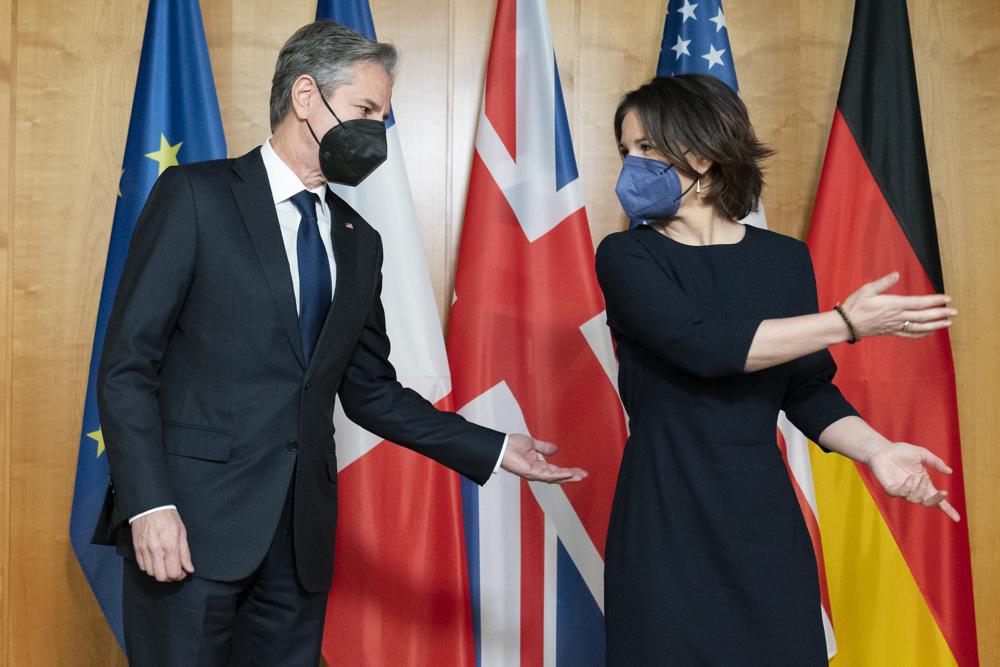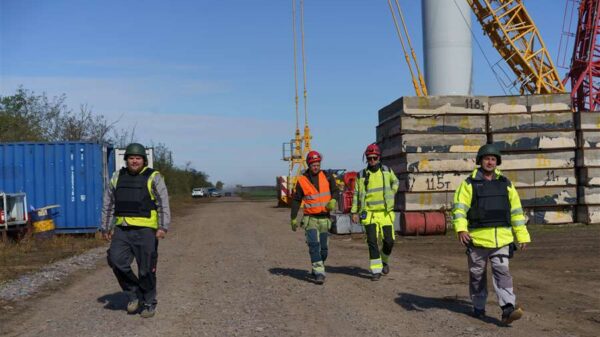US Secretary of State Antony Blinken, left, and German Foreign Minister Annalena Baerbock, depart for their meeting at the Ministry of Foreign Affairs, Thursday, Jan. 20, 2022, in Berlin, Germany. (AP Photo/Alex Brandon, Pool)
BERLIN (AP) — Top American and European diplomats sought to project a united front to Russia on Thursday over concerns that it may be planning an invasion of Ukraine.
Russia has massed an estimated 100,000 troops near Ukraine, and U.S. President Joe Biden said Wednesday he thinks Moscow will invade. He warned Russian President Vladimir Putin that his country would pay a “dear price” in lives lost and a possible cutoff from the global banking system if it does.
Against that backdrop, U.S. Secretary of State Antony Blinken held talks in Berlin on Thursday with diplomats from Germany, France and Britain — a so-called Quad meeting. A day earlier, he met Ukraine’s president in Kyiv to discuss the threat.
Russia has denied it is planning an invasion and, in turn, accused the West on Thursday of plotting “provocations” in Ukraine, citing the delivery of weapons to the country by British military transport planes in recent days.
Russian Foreign Ministry spokeswoman Maria Zakharova alleged that Ukrainian and Western talk of an imminent Russian attack was a “cover for staging large-scale provocations of their own, including those of military character.”
The U.S. and its NATO allies face a difficult task on the Ukraine crisis. Biden has said he is not planning to send combat troops in the case of a further Russian invasion. But he could pursue a range of less dramatic yet still risky military options, including supporting a post-invasion Ukrainian resistance.
The rationale for not directly joining a Russia-Ukraine war is simple. The United States has no treaty obligation to Ukraine, and war with Russia would be an enormous gamble. But doing too little has its risks, too.
The challenges of keeping the United States and its NATO allies united in their response to Russia were on display Wednesday, when Biden warned Russia against any invasion but also said a “minor incursion” would elicit a lesser response. He later sought to clarify that he was referring to a non-military action, such as a cyberattack — but the remark elicited a barrage of criticism at home that he was not being tough enough on Russia and raised the specter of possible divisions abroad.
In explaining the remark, Biden said “it’s very important that we keep everyone in NATO on the same page.”
Blinken, the top American diplomat, is set to deliver a speech on the Ukraine crisis later Thursday in the German capital before flying on to Geneva, where he will meet Russian Foreign Minister Sergey Lavrov on Friday.
In his speech to the Berlin-Brandenburg Academy of Sciences, Blinken will elaborate on the American position on Ukraine, the broader historical context of the current crisis, and the need for allies to present a unified front to confront Russia’s aggression and violations of international norms, U.S. officials said. They spoke on condition of anonymity because they weren’t authorized to publicly preview Blinken’s speech.
Blinken is also expected to address the Russian people to outline the costs that their country will pay should it move ahead with an invasion, they said.
While the meeting in Berlin will focus primarily on Ukraine, the ongoing talks over reviving a deal aimed at limiting Iran’s nuclear program will also be discussed, according to the officials.
Following his meeting with Bilnken this week, Ukrainian President Volodymyr Zelenskyy is scheduled to arrive Thursday in Poland, which has long supported Ukraine’s efforts to move closer to the democratic Western world.
That move westward is a key point of contention in the standoff with Russia. Moscow wants guarantees that NATO will not expand to include Ukraine and other ex-Soviet nations and that the alliance won’t deploy weapons to those countries.
Washington and its allies firmly rejected Moscow’s demands in security talks last week, but kept the door open to possible further talks on arms control and confidence-building measures to reduce tensions.
Associated Press writers Vladimir Isachenkov in Moscow and Vanessa Gera in Warsaw, Poland, contributed to this report.
Copyright 2021 Associated Press. All rights reserved.






























You must be logged in to post a comment Login